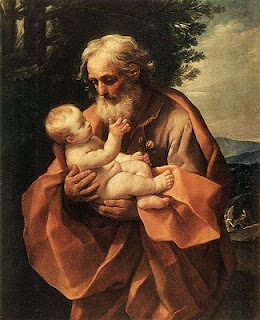 The recent Solemnity of Saint Joseph on March 19 was a welcome feast within Lent – and we’ll have another one next week: the Annunciation. When contemplating Saint Joseph, one of the many interesting unanswered questions about him is this: How old was he? Was he an older man who served as a guardian to the Virgin, or was he younger and more robust? I’ll lay out the two competing views in the next couple of posts. First up: the view that he was older.
The recent Solemnity of Saint Joseph on March 19 was a welcome feast within Lent – and we’ll have another one next week: the Annunciation. When contemplating Saint Joseph, one of the many interesting unanswered questions about him is this: How old was he? Was he an older man who served as a guardian to the Virgin, or was he younger and more robust? I’ll lay out the two competing views in the next couple of posts. First up: the view that he was older.
The Eastern wing of the Church has traditionally held that Saint Joseph was an older man, who betrothed and married Mary not for the purposes of romance, but protection – to be her legal guardian, as it were. The thinking here is that Mary had always planned on remaining a virgin dedicated to the service of God. Admittedly, this was a relatively rare position to take in Israel in the first century. But there are other examples, even in the same generation: Jesus himself (obviously), Saint Paul, and some of the Essenes, for starters. One could also add the prophetess Anna mentioned by Luke (2:36-38), who, although briefly married in her youth, lived out the rest of her days worshipping in the temple, consecrating herself to the Lord. She ostensibly could have sought remarriage, but didn’t. Mary may have been planning a similar life for herself.
But being an unmarried woman in the first century, especially if one was without extended family members to rely upon, may have been a precarious position to be in. Having a guardian, in the form of an older Saint Joseph, would have been a boon. Mary’s question to the archangel Gabriel, when told she would be the mother of the Messiah (“How can this be, since I am a virgin?” – Lk 1:34) is quite an odd question for an engaged woman to ask. Gabriel has said nothing at this point about the conception of Jesus being miraculous in nature – he does that a few verses later. Odd, that is – unless she was planning on remaining a virgin all along.
The concept of Joseph as an older man also carries explanatory power in other ways: most notably, it explains his absence from the adult ministry of Jesus. The presumption is that he had died by this point. Although the mother of Jesus is mentioned at key points in the ministry of the Lord, Joseph is nowhere to be found. This is felt most acutely at the crucifixion, where Jesus gives the care of his mother into the hands of – not Joseph, but the apostle John – inconceivable if Joseph had been living at the time (Jn 19:26-27). As well, in some strains of this tradition, Joseph is said to have been a widower, whose first wife had died some time before, when he married the Virgin. This may shed some light on who the alleged “brothers and sisters” of Jesus might have been. Certainly, they were not other children of Mary, but they may have been Joseph’s children from his previous marriage.
What do you think? Sound off in the comments box, but don’t forget to stay tuned for the other side of the argument, which I haven’t even presented yet – that Joseph was a much younger man. We’ll tackle that argument in the next post.

